لا تحاول أبدًا معرفة كيف يرتبط شخصان ببعضهما البعض في عائلة عربية إلا إذا كنت مستعدًا للاستماع إلى درس طويل ومفصل في علم الأنساب يمتد عبر عدة أجيال ويشمل ما لا يقل عن ثلاثة أبناء عمومة. كلمة "عم" أو "ابن عم" وحدها لا تكفي أبدًا – كل إجابة تأتي مع ملخص قصير لشجرة العائلة، وبحلول الوقت الذي ينتهون فيه، ربما تكون قد نسيت حتى لماذا سألت في المقام الأول. 😅
In Arab culture, family is not just about close relatives; it’s a vast, interconnected network where everyone seems to know everyone—or at least pretends to. 🙂 Family ties are not just biological; they form a social structure that influences relationships and interactions. It matters whether someone is related through the mother’s or father’s side, whether they are older or younger, and this is reflected in the precise terms used to address them. For example, the terms for “uncle” and “aunt” are far more specific than in many other languages, changing based on which side of the family they come from and their position in the family hierarchy. Respect for elders is particularly important, which is why a younger brother might even be called “Little Father” (Abu X), or an older sibling might receive a title that signifies honor and status.
إذا كنت تريد تعلم كلمة أم بالعربية وكلمة أب بالعربية، فمن الأفضل أن تبدأ بالأساسيات. أم بالعربية هي أم (Umm)، بينما أب بالعربية هي أب (Ab). من هنا، يتكشف نظام كامل حيث يحمل كل فرد من أفراد العائلة اسمًا محددًا بناءً على موقعه الدقيق داخل الأسرة. إذا كنت تتساءل عن كيفية مخاطبة العرب لأفراد عائلاتهم – وترغب في تجنب مناداة شخص غريب بـ"العم" عن طريق الخطأ – فتابع القراءة! 😃
If you want to deepen your knowledge of Arabic, try the PixiLearn Arabic learning app, where you can learn Arabic words and phrases in a fun and interactive way. Download it now and start learning! Learn Arabic words with PixiLearn
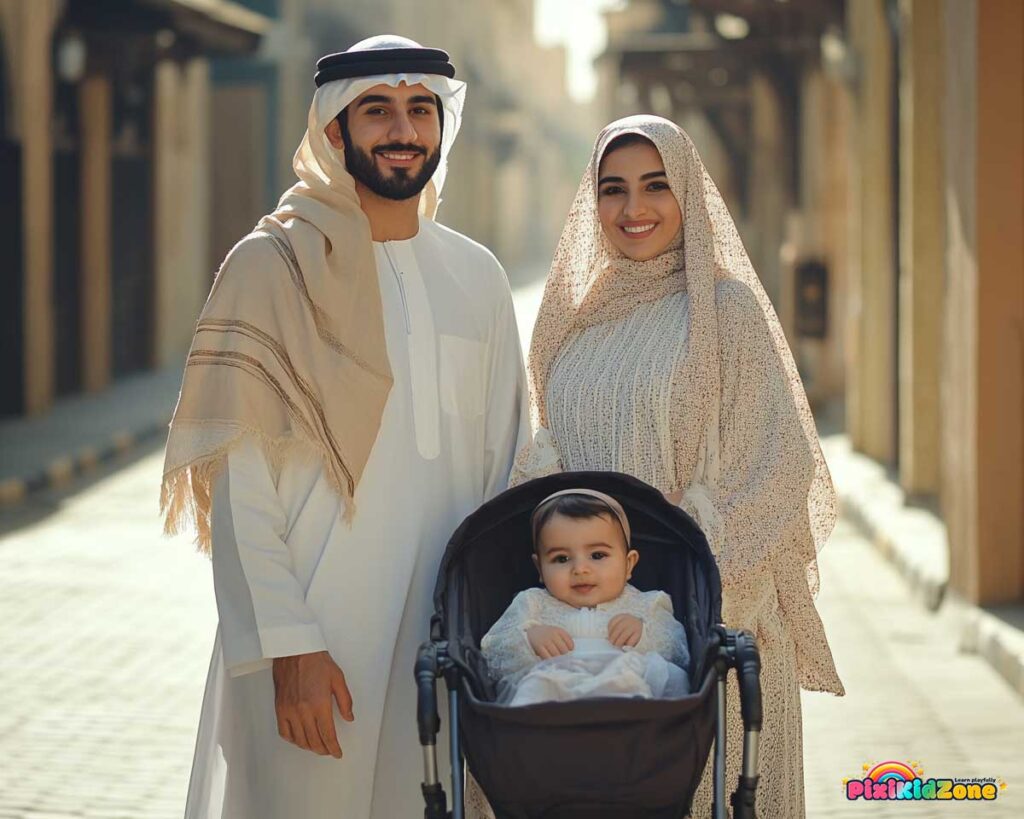
كلمة أم وأب بالعربية
كلمة أم بالعربية – أم (Umm)
في اللغة العربية، كلمة أم تعني أم (Umm) وتُنطق “Omm”.
تلعب الأمهات دورًا مركزيًا في الثقافة العربية، وغالبًا ما يُنظر إليهن على أنهن قلب الأسرة. تعكس اللغة العربية هذا الاحترام العميق من خلال ألقاب محببة مثل “أم + اسم الابن البكر”، حيث يُشار إلى الأم أحيانًا باسم ابنها الأكبر، مثل أم أحمد (والدة أحمد).
كلمة أب بالعربية – أب (Ab)
الكلمة العربية لـالأب هي أب (Ab) وتُنطق “Ab”.
في الثقافة العربية، يُنظر إلى الآباء تقليديًا على أنهم رب الأسرة، المسؤولون عن التوجيه والدعم. وكما هو الحال مع الأمهات، يحصل الآباء أيضًا على ألقاب شرفية، غالبًا “أبو + اسم الابن البكر”، مثل أبو خالد (والد خالد)، مما يرمز إلى دورهم ومكانتهم داخل الأسرة.
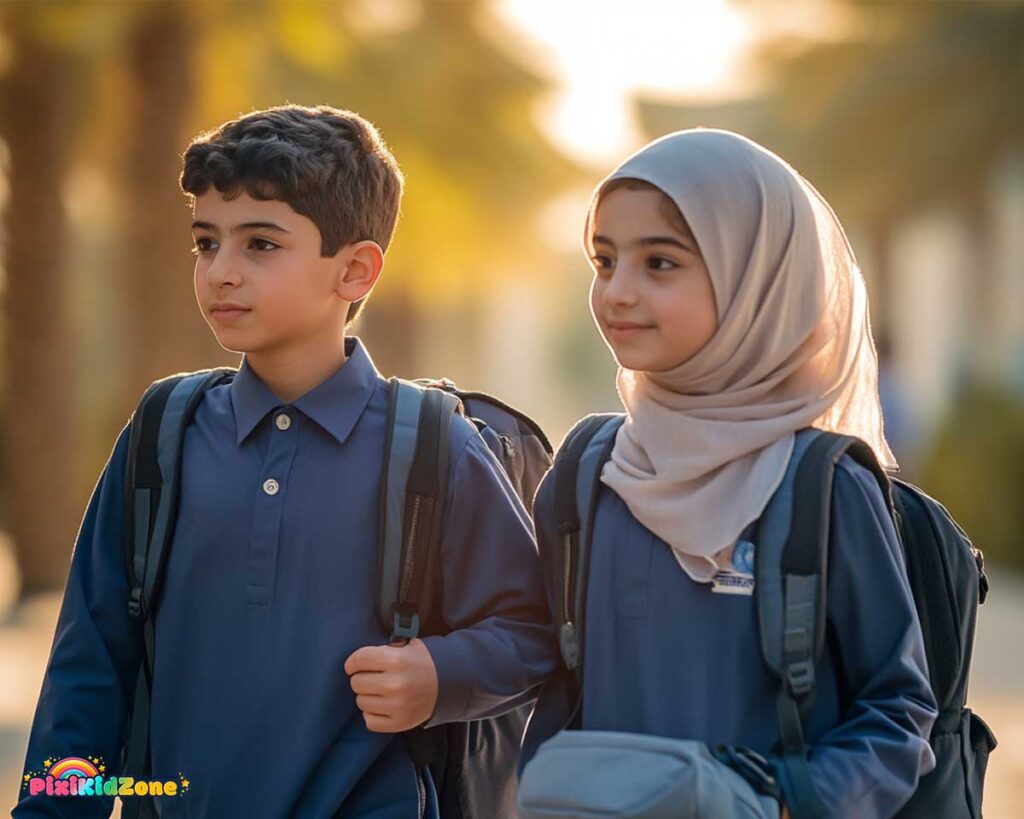
كلمة ابن وابنة بالعربية
كلمة ابن بالعربية – ابن (Ibn)
في اللغة العربية، الكلمة المستخدمة لـالابن هي ابن (Ibn)، وتُنطق “Ibn” أو “Bin” في بعض اللهجات.
لا يُستخدم مصطلح Ibn في المحادثات العائلية اليومية فحسب، بل يظهر أيضًا في السياقات التاريخية والرسمية، مثل الأسماء (Ibn Sina، بمعنى ابن سينا). في المجتمع العربي التقليدي، يُنظر إلى الأبناء غالبًا على أنهم حاملون لاسم العائلة وإرثها.
كلمة بنت بالعربية – بنت (Bint)
الكلمة العربية لـابنة هي بنت (Bint) وتُنطق “Bint”.
على عكس Ibn الذي يُستخدم غالبًا في الأسماء الكاملة، يظهر Bint في سياقات النسب، مثل “Bint Ali”، والتي تعني ابنة علي. تاريخيًا، كان هذا المصطلح يُستخدم في العائلات النبيلة لإبراز النسب. في العديد من الأسر العربية، تحظى البنات بمكانة مميزة وغالبًا ما يحصلن على ألقاب محببة.
Arabic Word for Brother and Sister
Brother in Arabic – أخ (Akh)
In Arabic, the word for brother is أخ (Akh), pronounced as “Akh” (with a soft “kh” sound, like the German “Bach”).
In Arab culture, the bond between siblings is highly valued. An older brother (Akh Kabeer – أخ كبير) often takes on a protective and guiding role within the family, while younger brothers (Akh Sagheer – أخ صغير) are expected to show respect and follow their elders’ advice.
Sister in Arabic – أخت (Ukht)
The Arabic word for sister is أخت (Ukht), pronounced as “Ukht”.
Sisters hold a special place in Arab families, often taking on nurturing roles. An older sister (Ukht Kabeera – أخت كبيرة) is traditionally viewed as a second mother, offering guidance and care, while younger sisters (Ukht Sagheera – أخت صغيرة) are usually pampered and protected by their siblings.
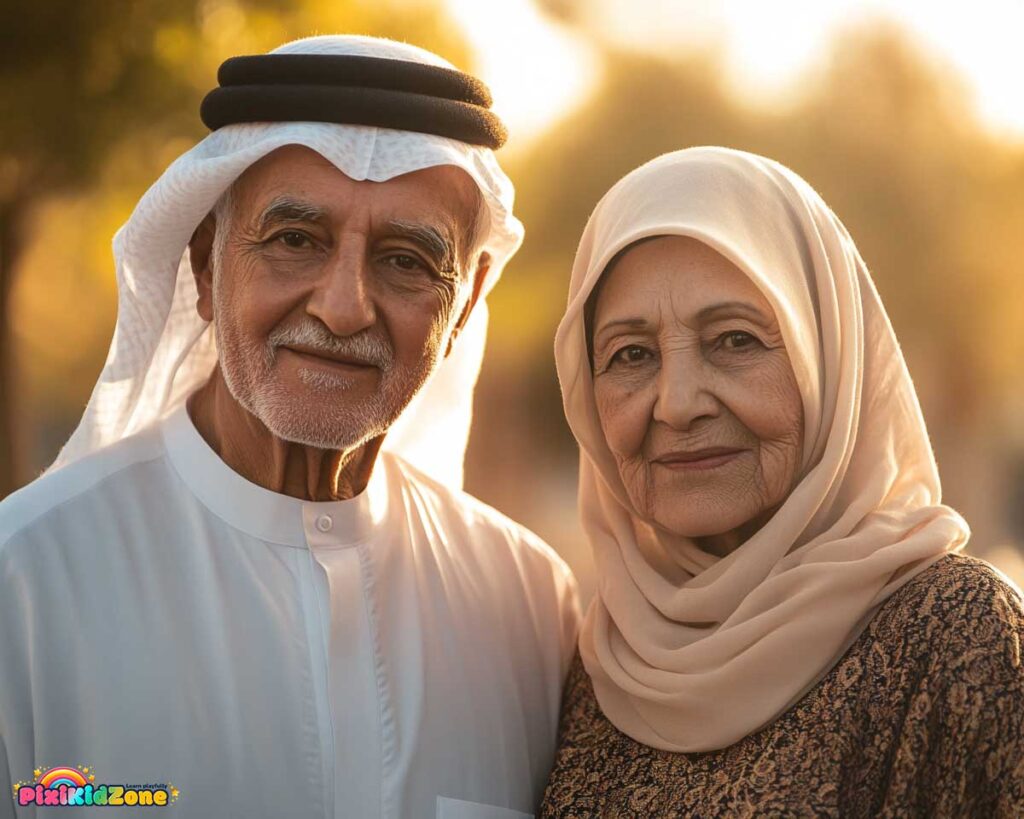
Arabic Word for Grandfather and Grandmother
Grandfather in Arabic – جد (Jadd)
In Arabic, the word for grandfather is جد (Jadd), pronounced as “Jadd”.
Grandfathers are highly respected in Arab families, often seen as the family’s wisdom keepers. They play an important role in passing down traditions, stories, and values. In some regions, affectionate terms like “Jiddi” (جدي) or “Sidi” (سيدي) are used to address grandfathers, reflecting deep respect and closeness.
Grandmother in Arabic – جدة (Jadda)
The Arabic word for grandmother is جدة (Jadda), pronounced as “Jadda”.
Grandmothers are often the heart of the household, known for their hospitality and love, especially when it comes to cooking! In some dialects, grandmothers are lovingly called “Teta” (تيتا) or “Jiddati” (جدتي). Their role extends beyond the family, as they often serve as the unifying force keeping multiple generations connected.
Arabic Word for Uncle and Aunt
Uncle in Arabic – عم (Am) / خال (Khal)
In Arabic, there are two different words for uncle, depending on whether he is from the father’s or mother’s side:
- عم (Am) – Paternal uncle (father’s brother), pronounced as “Am”
- خال (Khal) – Maternal uncle (mother’s brother), pronounced as “Khal”
Uncles often play a significant role in Arab families, acting as second fathers. The عم (Am), being from the father’s side, is often seen as an authoritative figure, while the خال (Khal) is traditionally known for being more affectionate and easygoing.
Aunt in Arabic – عمة (Amma) / خالة (Khala)
Just like with uncles, Arabic distinguishes between aunts from the paternal and maternal sides:
- عمة (Amma) – Paternal aunt (father’s sister), pronounced as “Amma”
- خالة (Khala) – Maternal aunt (mother’s sister), pronounced as “Khala”
Aunts, especially maternal ones (Khala), often take on a nurturing and caring role in a child’s life. The “Khala” is sometimes considered a second mother, while the “Amma” can hold a more traditional role within the extended family structure.
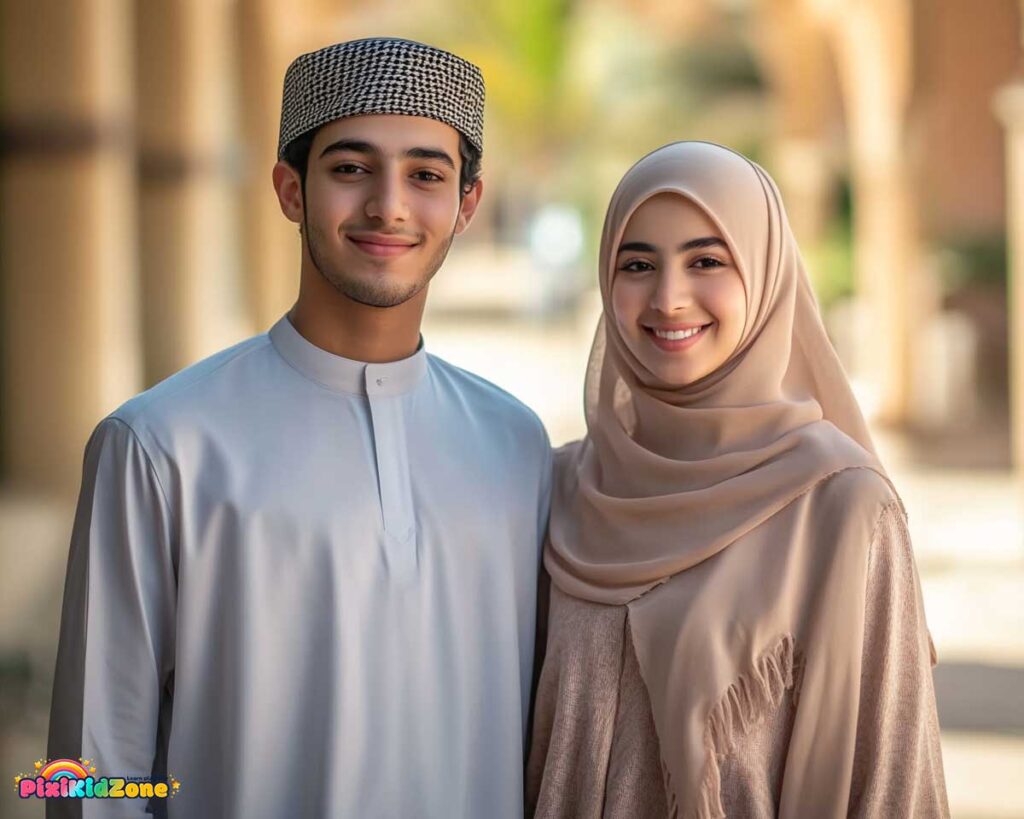
Arabic Word for Cousin (Male and Female)
Male Cousin in Arabic – ابن عم (Ibn Am) / ابن خال (Ibn Khal)
In Arabic, the word for male cousin depends on whether he is from the father’s or mother’s side:
- ابن عم (Ibn Am) – Paternal cousin (father’s brother’s son), pronounced as “Ibn Am”
- ابن خال (Ibn Khal) – Maternal cousin (mother’s brother’s son), pronounced as “Ibn Khal”
Cousins in Arab families are often as close as siblings, and in some cases, they even grow up together. Historically, in many Arab cultures, paternal cousins (especially Ibn Am) were considered potential marriage partners due to strong family ties and traditions.
Female Cousin in Arabic – بنت عم (Bint Am) / بنت خال (Bint Khal)
Similarly, the word for female cousin also changes depending on which side of the family she is from:
- بنت عم (Bint Am) – Paternal cousin (father’s brother’s daughter), pronounced as “Bint Am”
- بنت خال (Bint Khal) – Maternal cousin (mother’s brother’s daughter), pronounced as “Bint Khal”
Female cousins share a special bond in Arab families, often being treated as sisters. Just like with male cousins, Bint Am was traditionally seen as a close family connection, sometimes even a future spouse in arranged marriage traditions. However, in modern Arab society, cousin relationships are more about family unity and lifelong friendships.
Arabic Word for Grandson and Granddaughter
Grandson in Arabic – حفيد (Hafeed)
In Arabic, the word for grandson is حفيد (Hafeed), pronounced as “Hafeed”.
Grandsons hold a special place in Arab families, often being cherished and spoiled by their grandparents. In many cases, grandparents play an active role in raising and mentoring their grandsons, passing down traditions, stories, and wisdom.
Granddaughter in Arabic – حفيدة (Hafeeda)
The Arabic word for granddaughter is حفيدة (Hafeeda), pronounced as “Hafeeda”.
Granddaughters are equally adored, often receiving special attention from their grandmothers, who teach them family traditions, cooking secrets, and cultural values. In some Arab families, the first granddaughter even takes on a special role as the “little queen” of the household, bringing joy to everyone.
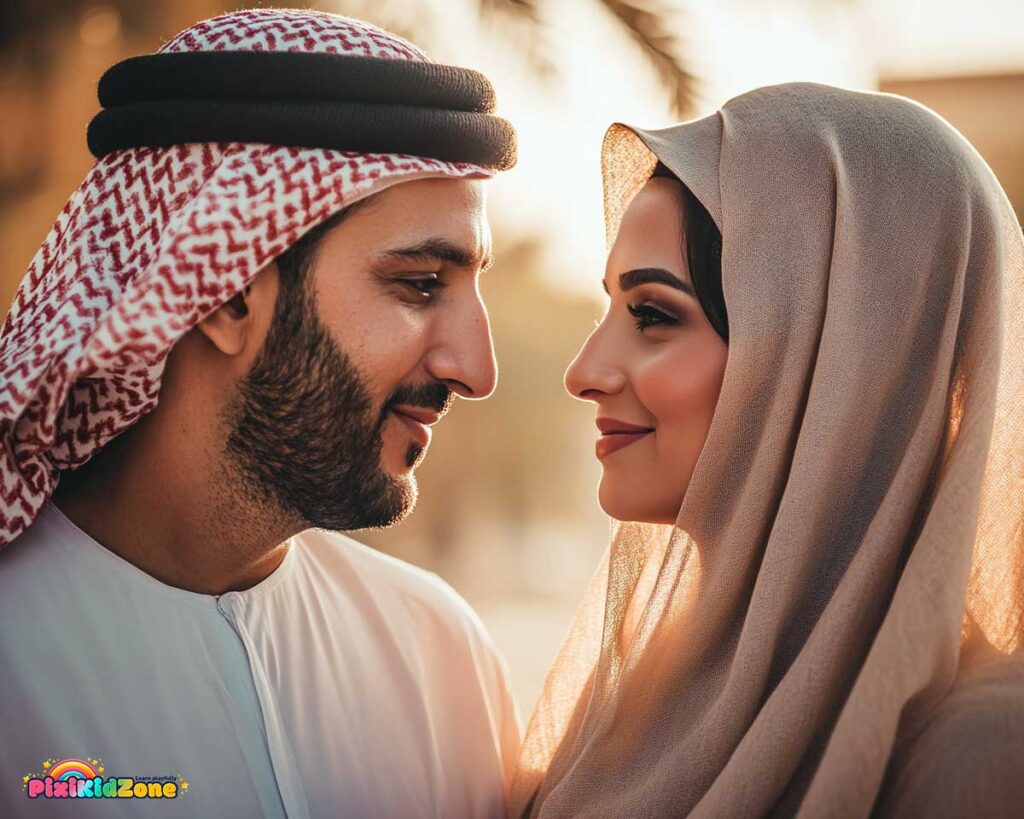
Arabic Word for Husband and Wife
Husband in Arabic – زوج (Zawj)
In Arabic, the word for husband is زوج (Zawj), pronounced as “Zawj”.
Marriage is highly valued in Arab culture, and the role of a husband extends beyond being a life partner—he is traditionally seen as the provider and protector of the family. The word “Zawj” can also mean “pair” in Arabic, emphasizing the idea of partnership and unity in marriage.
Wife in Arabic – زوجة (Zawja)
The Arabic word for wife is زوجة (Zawja), pronounced as “Zawja”.
Wives in Arab families hold an essential role, often seen as the heart of the home. In many traditional settings, the wife is responsible for maintaining family bonds, raising children, and preserving cultural traditions. The word “Zawja” comes from the same root as “Zawj”, reinforcing the idea that husband and wife are two halves of a whole.
Now You Know How to Address Someone in Arabic!
Learning Arabic family terms is not just useful for language learning—it’s a real cultural gateway. In Arab families, kinship ties mean much more than just blood relations—they shape social interactions, forms of respect, and even daily greetings.
If you ever visit an Arab family, you won’t be surprised to find that uncles and aunts have different specific titles, or that “Abu” and “Umm” (Father and Mother) are often followed by the name of their firstborn child. And if you ever ask, “How are these two related?”, you’ll quickly realize that it’s best to sit down and grab a notebook.
Now that you know the most important Arabic family words, maybe it’s time to try using them in a conversation. Who knows? The next time an Arab grandmother smiles at you, you might just know exactly how to address her. 😉
هل قرأت هذه بالفعل؟
هل تريد معرفة المزيد عن العربية المصرية؟ اكتشف ما هي اللغة التي يتحدث بها المصريون بالفعل! https://pixikidzone.com/ar/blog/speak-the-egyptian-language-but-wait-what-language-do-they-actually-speak/
هل أنت فضولي لمعرفة كيفية قول "كيف حالك؟" باللغة العربية؟ تعلّم أكثر الطرق تهذيبًا! https://pixikidzone.com/ar/blog/arabic-for-how-are-you-learn-how-to-ask-politely/
هل تساءلت يومًا عن الكلمات النابية في اللغة العربية؟ اكتشفها من اللهجات المغربية إلى الخليجية مع النطق! https://pixikidzone.com/ar/blog/swear-words-in-arabic-from-moroccan-to-gulf-with-pronunciation/

 العربية
العربية



 English
English 简体中文
简体中文 Español
Español Deutsch
Deutsch Português
Português Magyar
Magyar Русский
Русский Français
Français हिन्दी
हिन्दी











